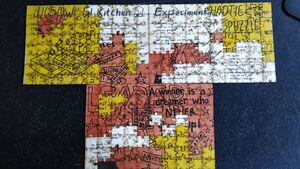User:Erica: Difference between revisions
| Line 133: | Line 133: | ||
Publishing something through an API is something that still blows my mind. I've always been interested in how technologies shape the transmission of knowledge between different systems, creating often unfair relations of power, so I really appreciated the fact of being able to speculate on the politics of an API that translates information according to our beliefs and values. I'm really interested in creating the conditions for a production of culture in which those relations of powers are balanced out by intervening on its very infrastructure. | Publishing something through an API is something that still blows my mind. I've always been interested in how technologies shape the transmission of knowledge between different systems, creating often unfair relations of power, so I really appreciated the fact of being able to speculate on the politics of an API that translates information according to our beliefs and values. I'm really interested in creating the conditions for a production of culture in which those relations of powers are balanced out by intervening on its very infrastructure. | ||
I also really liked the idea of messing around with different registers of language. When in our group we where discussing about the power of broken English and the songs by Linton Kwesi Johnson, and then when we intervened on the text of Mitsotakis's public speech, I felt there was something important at stake, and I'd really like to include this process in my future projects. | |||
In some pages of my notebook I wrote: | In some pages of my notebook I wrote: | ||
Revision as of 21:44, 28 March 2022
Bonzurrr some documentation and sparse reflections about these 2 first terms.
SI16 Vernacular Language processing
the process
first approach with annotations
📑 https://pad.xpub.nl/p/Performative_Materiality_and_Theoretical_Approache
annotation of Performative Materiality and Theoretical Approaches to Interface, by Johanna Drucker
with Kamo Jian and Supi
first approach with python
grr's faces and house of dust with random.choice() I really had a lot of fun with line printers
((((((°)))))) ..................................
/ > < | ////////////////////////////////// \
S WW S ////////////////////////////////// \
\ v======v / ................................. |
\___________/ |A barrack OF GLASS
| BY A RIVER
| USING baby mosquitos
| demolished BY xpubbers
mix of sources
📑 https://pad.xpub.nl/p/Group2.2 Great conversation with Carmen, Emma, Gersande and Miriam.
We started looking at possible outcomes for our first Special Issue. Back then we still had in mind the idea of creating a reader that travels, via delivery or correspondence, via chat and across different media. Looking retrospectively, this conversation brought to the formulation of a lot of premises around the approach and the distribution of the SI17, that were then processed into smaller aspects of it or even into different subgroups' projects.
Transcription exercise
📑 https://pad.xpub.nl/p/transcription_grgr_%2B_chaey with Chae (need to ask for the video to her)
Rejection
📑 https://pad.xpub.nl/p/Rejection_Glossary
here's the list of today (18/10/21) about rejection
\\\\\\\\\\\\\\\\\\\\\\\\\\\\\( ⓛ ω ⓛ *)\\\\\\\\\\\\\\\\\\\\\\\\\\\\\
autumn break & a lot of new toys for the soupboat
🎤 karaoke republishing tool
Which started from a joke with Kamo, but then became a more serious republishing tool and later on involved Mitsa, Alex and Chae as well (the project branched between the Room for Sound residency, although we couldn't continue, and a contribution that is now part of SI#17)
🥣 soup-generator
A collaborative cookbook of soup recipes added to a json file via python, with tag system and diary.
🍜📔 soup-diary
Here I learned to use wiki's api to print via js in order to use the wiki as a cms and print the contents on a html page on the soupboat Diary of a 🥣 eater
🎉 B-day counter
WIP
\\\\\\\\\\\\\\\\\\\\\\\\ end of autumn break \\\\\\\\\\\\\\\\\\\\\\\\
study week
html workshop with Kamo Pimp my Soupboat
still talking about rejection, but now in a more conscious way.
great workshop with Nor this was my self-portrait
Replace() and Rejection as filter, empowerment and forced poetics
📑 https://pad.xpub.nl/p/si16-protoyping-week-7
experiments with the replace function
The first experiments with text processing were approaching text as something that has some fixed part and some more malleable and soft ones. The idea was to intervene physically on the text manipulating some part like a clay tablet in which certain areas are not dried yet. In this process some part were confirmed, while others rejected and substituted with other words or emojis, in order to decontextualise the text and give to it a new meaning.
The 🌛 anus, excerpt from Bataille's The solar anus, replacements with emojis. With Mitsa
Chimeric API, an original essay by Tiger Dingsun in which the terms graphic design are replaced with API. (insert link) with Kamo & Mitsa
Forced Documentation, an original excerpt by Edouard Glissant, in which the word 'poetics' has been replaced with 'documentation' (insert link) with Mitsa & Carmen
Ok, from this moment on, the process began to be more focused towards the making of an API and the subgroup's project
And I wish you that your question has been answered
with Carmen, Miriam and Mitsa
This text is a transcribed excerpt from the Press Conference that followed the meeting between the Greek Prime Minister Kyriakos Mitsotakis and the Dutch Prime Minister Mark Rutte on November the 9th, 2021 in Athens. During the Q&A, the Dutch reporter Ingeborg Beugel asked Mitsotakis for clarity and honesty referring to pushbacks which Greek border guards keep committing towards refugees, while the Greek Government systematically conceals such violence. She continued by asking Mark Rutte what the political stance of the Netherlands towards refugees' relocation and Mitsotakis's policy would be.
The choice of this text as our source material has different reasons. First of all, we were interested in how language can produce categories and shape identities: how does wording create precise borders between the "us" and the "them"? Our second step would be reflecting on text processing strategies through which a speech or a narration can be recontextualised and reclaimed. By replacing or taking out words of a discourse, and thus making some parts of it interchangeable, we tried to highlight how its phrasing is never neutral, but always a choice led by a particular purpose.
We decided to work on this text as the Press Conference took place at the moment we were developing our research, and as we were really interested on the distinctive rhetoric strategies that Beugel, Mitsotakis and Rutte choose for voicing their goals. It is clear that the reporter uses an emotional and provocative tone to address Mitsotakis' politics, which challenges his composure to a point where he can not keep it anymore, while when talking to Rutte, her speech is more calm and detached. In response to her question, both Prime Ministers refuse responsibility of their actions: they use a rather managerial and pre-designed language to neutralize the reporter's provocation while at the same time praising the generosity and the efforts of their countries. In particular, Mitsotakis denies any of Beugel's accusations and declares them as unsupported assumptions which is a mere demonstration of power. Alongside, Rutte uses a colder and more restrained language to rationalize the EU and the Greek Government's choices: While shifting the responsibilities for refugee protection, he actually justifies the crimes that are committed within the EU borders as an inevitable "tough, but fair, policy".
Concerning our project, it is an act of persistent resistance. We created a few functions to facilitate an iterative process of refusal towards the two Prime Ministers' answers and any of their possible versions. We invite you to play as much as you want with these functions and create your own answers as counter-reaction to Mark Rutte's final sentence: "So this is my answer and I wish that your question has been answered". Every new answer, every new iteration, can be submitted to our Archive of Repetitive Answers. Although they will never be good enough, nor shall they be accepted as exhaustive, we consider the modified answers as a trigger for a never-ending dialogue.
Learning how to walk while cat walking
from the restaurant's meme to we're making an API with Flask
did a prototype with strapi-nuxt and with node.js-express db, and mapped a possible structure of the SI#16 API together with Kamo.
In the end 👹 & 👺 introduced us to Flask's Magical world and we got trapped. In a good way.
And we dropped the idea of using rejection as conceptual compass for our vernacular APIs.
Intro of the Special Issue
read on the website ↗ read on pad ↗
politics of the API
License + ToS of the SI#16 API + error messages read on pad ↗
Reflection
from Reflective Diary about the Special Issue 16
Publishing something through an API is something that still blows my mind. I've always been interested in how technologies shape the transmission of knowledge between different systems, creating often unfair relations of power, so I really appreciated the fact of being able to speculate on the politics of an API that translates information according to our beliefs and values. I'm really interested in creating the conditions for a production of culture in which those relations of powers are balanced out by intervening on its very infrastructure.
I also really liked the idea of messing around with different registers of language. When in our group we where discussing about the power of broken English and the songs by Linton Kwesi Johnson, and then when we intervened on the text of Mitsotakis's public speech, I felt there was something important at stake, and I'd really like to include this process in my future projects.
In some pages of my notebook I wrote:
Why should you use a tool that you don't master?
- because it's a way to address people who know how to use it, i.e. high specialized pepople
- because it's a way to break hierarchies
- in order to widen the access to that tool by claiming back the legitimacy to use it in a non-professional way
- because there is a desire for gaining agency, of feeling legitimized, accepted and ultimately liberated.
Understanding the implications of using an API as a publishing tool in 2021 was revealing and in a certain way liberating. Although I know some of us consider the concrete outcome of the SI16 a failure, I still think the means we used shall not be taken for granted at all.
SI17 Productive Play
The process
What is a loot box??
The loot box is a temporized tool for the distribution and management of resources between the inside of the gameplay and the outside of the gameplay. Loot box is like a pulse in the circulation of resources between virtual game and the reality outside of it. Loot box is temporized because it sets the beat, it's a repetitive rhythm for the player's temporality. It builds an habit by triggering the attention and the emotional response of the player, and ensuring that the player keeps playing potentially forever (from habit to addiction). The loot box is also a mechanism that focuses on individual engagement, a personalized 1 to 1 interaction, or 1 to machine interaction. an immediately rewarding response preceded by a generally customized trigger. But these are also the things I would like to change or make them fairer in our SI17 loot box.
Contributions
🎧 Sound cancelling headset ideology
📑 https://pad.xpub.nl/p/noice_cancelling_devices_turns_off_also_your_inner
Glossary Productive Play
https://pzwiki.wdka.nl/mediadesign/Glossary_of_productive_play
🎶🎤 Karaoke
📑 https://pad.xpub.nl/p/si17-karaoke
🍥 Katamari fanfic
📑 https://pad.xpub.nl/p/katamari-fanfiction
🧩 Chaotic evil jigsaw puzzle
Which never became part of the SI17, also because of production issues, B✨U✨T it had great experimental potential.
📑 https://pad.xpub.nl/p/chaotic-evil-puzzles
We printed 85000 post-its
Proposal to bring together all the contents:
📑 https://pad.xpub.nl/p/post-it
Contact of the vendors for printing and field trip to think along with the printer guys
contribution to the visual identity:
🖱 https://www.figma.com/file/wVdpA2iwKN3hT9YXONqXTj/SI17
reflections
To come
Developed interests
To come


